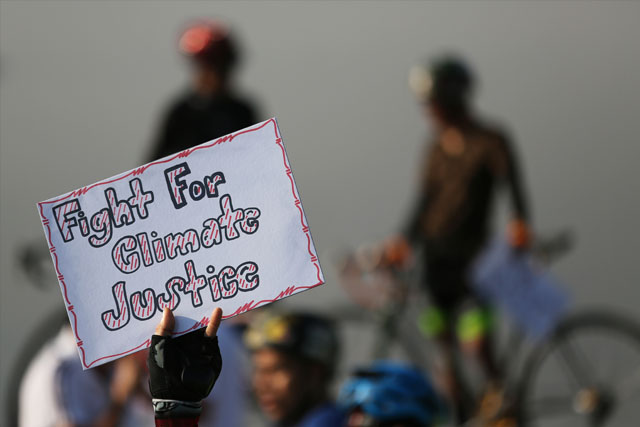Report: Philippines among deadliest countries for environmental activists
July 14, 2017 | 2:48am

An activist raises a slogan during a rally in Manila, on Sunday, Dec. 13, 2015 to criticize the agreement reached during the United Nations conference on climate change, Conference of Parties 21 (COP21) in Paris. Nearly 200 nations adopted the first global pact to fight climate change on Saturday, calling on the world to collectively cut and then eliminate greenhouse gas pollution but imposing no sanctions on countries that don’t. AP/Aaron Favila, File
BAGUIO CITY — The Philippines was tagged as among the deadliest countries in the world for environmental defenders for four years straight now.
It is also one of the deadliest in Asia for land defenders with at least 28 land and environmental defenders killed in 2016, Global Witness, a London-based non-government organization said in its report titled "Defenders of the Earth" released Monday evening.
"The Philippines is once against declared as among the deadliest countries in the world for environmental defenders for four years running. The trend is expected to worsen by 2017 with no fundamental change in the country’s environmental policies on one hand, and increasingly fascist police and military campaigns of President Rodrigo Duterte on the other," said Leon Dulce, campaign coordinator of Kalikasan People’s Network for the Environment, a partner organization of Global Witness in the Philippines.
"In just the first half of 2017, we have monitored at least 10 more cases of environment-related killings," he added.
2016 deadliest year for environment activists
The report also declared 2016 as the deadliest year for the environment and land defenders with at least 200 people killed across the globe, more than twice the number of journalists which was at 79. This meant that almost four people were murdered every week last year. The trend is both growing (up from 185 in 2015) and spreading with murders reported in 24 countries compared to 16 in 2015.
Mining was also declared the "bloodiest trade," with at least 33 murders linked to the sector, the report said. Killings linked to logging companies increased from 15 to 23 in one year, while there were 23 killings connected to agribusiness projects, it added. Almost 40 percent of those murdered were indigenous people.
Police and soldiers are being suspected perpetrators in at least 43 murders.
Global Witness campaigner Ben Leather said: "States are breaking their own laws and failing their citizens in the worst possible way. Brave activists are being murdered, attacked and criminalized by the very people who are supposed to protect them."
Duterte's accountability
The Philippines has been among countries with the highest number of killings since 2013 when Global Witness first launched the international report.
A total of 144 cases of killings in the country since 2002 has been recorded by the NGO.
Kalikasan PNE attributed the worsening impunity against Filipino environmental defenders under the Duterte administration to fundamentally unchanged economic policies, especially on extractive and destructive projects enforced by its bloody counter-insurgency operations.
From June 2016 to the present, the environment group monitored at least 17 environment-related killings—the worst annual rate of killings over the past two administrations spanning 16 years, the environment group added.
Dulce said mining-related killings accounted for 47 percent of the cases they monitored during the first year of the Duterte administration. Suspected state armed forces were accused of involvement in 41 percent of these cases, and 65 percent were perpetrated in Mindanao where, he said, "plunder and militarization is most widespread."
Dulce said that among those hardest hit by the increasing militarization are the indigenous Lumad people of Mindanao. He cited the murder of Jimmy Saypan, a Lumad peasant leader from the province of Compostela Valley who was allegedly brutally assassinated on Oct. 10 last year by suspected military agents. Saypan was among the leaders of the Compostela Farmers Association, which led barricades and protests against the Agusan Petroleum and Minerals Corporation, a company affiliated with the San Miguel Corporation.
Kalikasan PNE said the Duterte administration must be held accountable "for the worsening climate of impunity against Filipino environmental defenders." The group also demanded an investigation into the country's security and counter-insurgency programs and to pull out of rural communities the military, paramilitary and police forces to stem militarization.
BrandSpace Articles
<
>
- Latest
- Trending
Trending
Latest
Trending
Latest
Recommended






























